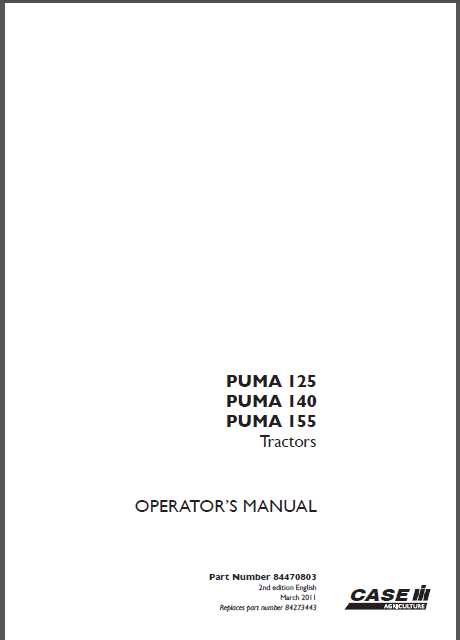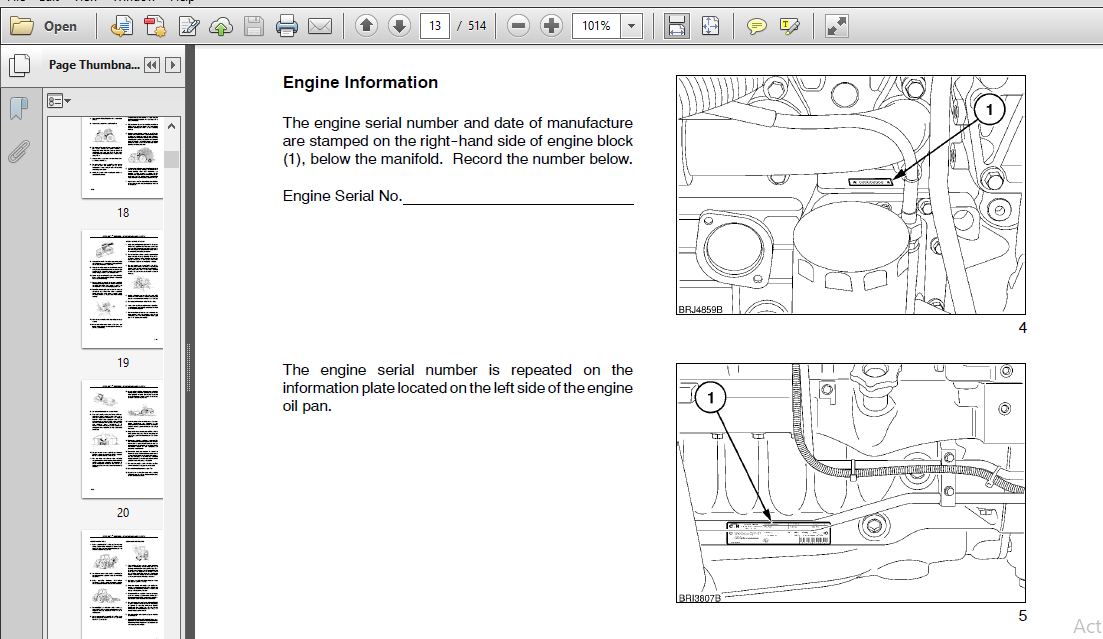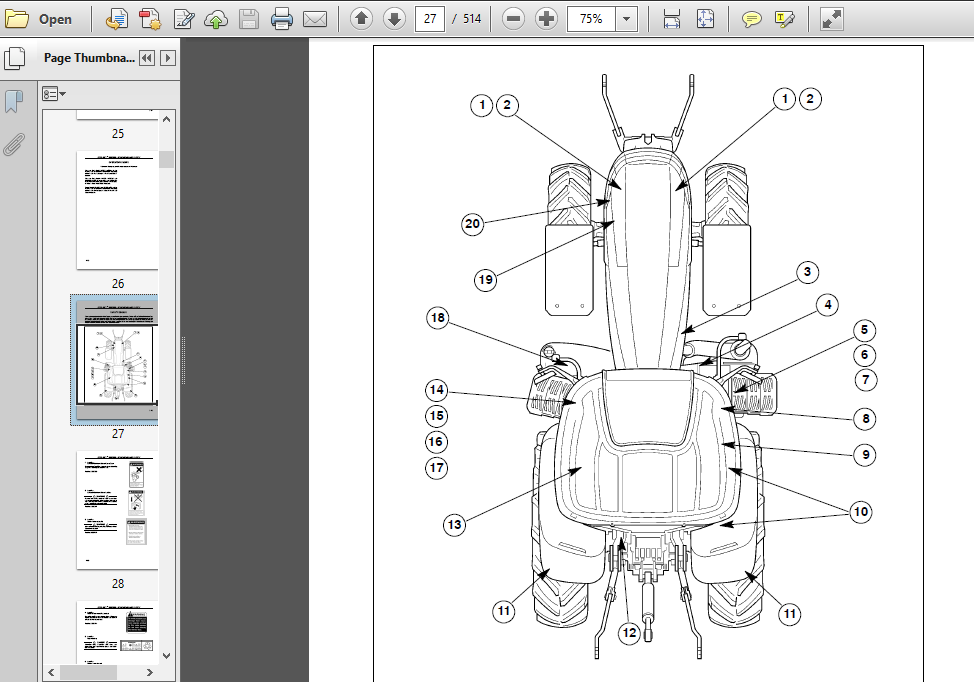Case IH Tractor PUMA 125, 140, 155 Tractors built Jan 2010 and after Operator’s Manual
FILE DETAILS:
Case IH Tractor PUMA 125, 140, 155 Tractors built Jan. 2010 and after Operator’s Manual_84470803
Size : 6.49 MB
Format : PDF
Language : English
Number of Pages : 514 pages
Brand: Case IH
Type of machine: Tractor
Type of document: Operator’s Manual
Model: Puma® 125, Puma® 140, Puma® 155
Part No: 84470803
VIDEO PREVIEW OF THE MANUAL:
IMAGES PREVIEW OF THE MANUAL:



DESCRIPTION:
Case IH Tractor PUMA 125, 140, 155 Tractors built Jan. 2010 and after Operator’s Manual_84470803
TO THE OWNER:
GENERAL INFORMATION:
- This Manual has been prepared to assist you in the correct procedure for running–in, driving and operating and for the maintenance of your new tractor. Read this Manual carefully. Your tractor is intended for use in normal and customary agricultural applications.
- If at any time you require advice concerning your tractor, do not hesitate to contact your authorised dealer. He has factory trained personnel, genuine manufacturers’ parts and the necessary equipment to carry out all your service requirements.
- Your tractor has been designed and built to give maximum performance, economy and ease of operation under a wide variety of operating conditions. Prior to delivery, the tractor was carefully inspected, both at the factory and by your dealer to ensure that it reaches you in optimum condition.
- To maintain this condition and ensure trouble–free operation, it is important that the routine services, as specified in Section 4 of this Manual, are carried out at the recommended intervals.
OPERATORS MANUAL STORAGE :
- The Operators Manual supplied with your tractor is an important source of information and should be stored safely. The manual is written specifically for your tractor so it is important that you make a note of the print number and issue date which can be found on the cover.
- In the event the manual is lost or damaged it can be replaced with the correct version. A storage pocket for the Operators Manual can be found on the rear of the seat. The manual should be kept in this pocket at all times when not in use.
CLEANING THE TRACTOR :
- Your tractor is a state-of-the-art machine with sophisticated, electronic controls. This should be taken into consideration when cleaning the tractor, particularly if using a high pressure washer. Even though every precaution has been taken to safeguard electronic components and connections, the pressure generated by some of these machines is such that complete protection against water ingress cannot be guaranteed.
- When using a high pressure washer, do not stand too close to the tractor and avoid directing the jet at electronic components, electrical connections, breathers, seals, filler caps, etc. Never direct a cold water jet at a hot engine or exhaust.
ELECTRO-MAGNETIC INTERFERENCE (EMC):
This tractor complies strictly with the European Regulations on electro-magnetic emissions. However, interference may arise as a result of add-on equipment which may not necessarily meet the required standards. As such interference can result in serious malfunction of the unit and/or create unsafe situations, you must observe the following:
- Ensure that each piece of non-Case IH equipment fitted to the tractor bears the CE mark.
- The maximum power of emission equipment (radio, telephones, etc.) must not exceed the limits imposed by the national authorities of the country where you use the tractor.
- The electro-magnetic field generated by the add-on system should not exceed 24 V/m at any time and at any location in the proximity of electronic components. Failure to comply with these rules will render the Case IH warranty null and void.
TABLE OF CONTENTS:
Case IH Tractor PUMA 125, 140, 155 Tractors built Jan. 2010 and after Operator’s Manual_84470803
Section 1 — General Information and Safety
To the Owner 1–1
Product Identification 1–4
Ecology and the Environment1–8
Safety Precautions 1–10
Safety Decals 1–19
International Symbols1–27
Airborne Noise Emission1–28
Section 2 — Controls, Instruments and Operation
Integrated Control Panel 2–2
Cab 2–4
Electrical Power Sockets2–22
Seats 2–26
Integrated Control Unit 2–36
Enhanced Keypad and Performance Monitor 2–50
Brake Controls and Operation 2–83
Semi–Powershift Transmission 2–88
Full Powershift Transmission 2–118
Differential Lock and Four Wheel Drive 2–143
Front Axle Suspension 2–147
Section 3 — Field Operation
Important Information 3–1
Boosting the Tractor Battery 3–8
Starting the Engine3–9
Stopping the Engine 3–12
Power Management 3–15
Constant Engine Speed 3–16
Headland Management Control3–20
Turn Assist3–40
Rear Power Take–Off3–42
Front Power Take–Off and Hydraulic Lift 3–60
Electronic Hitch Control 3–84
Remote Control Valves 3–100
Electro–Hydraulic Remote Control Valves3–107
Three–point Hitch 3–141
Quick Hitch 3–147
Linkage Stabilisers 3–149
Drawbars and Towing Attachments 3–153
Trailer Braking Systems3–168
Front Wheel Track Adjustment3–175
Rear Wheel Track Adjustment 3–183
Ballasting and Tyres3–194
Section 4 — Lubrication and Maintenance
General Information 4–1
Guard Removal4–8
Lubrication and Maintenance Chart4–12
Servicing: When Warning Lights Illuminate4–15
10–hour/daily service4–19
50–hour service 4–21
100–hour service 4–33
300–hour service 4–32
600–hour service 4–35
1200–hour/12 month service4–42
1200–hour/24 month service4–49
Every 3 years 4–56
General Maintenance — as required4–58
Storing the Tractor4–83
Section 5 — Fault Finding
Introduction 5–1
Engine 5–4
Transmission 5–7
Hydraulics 5–8
3-point Hitch5–9
Brakes 5–10
Cab5–10
Electrical 5–11
Section 6 — Accessories
Auxiliary Headlights6–2
Battery Isolator Switch6–2
Section 7 — Specification
General Dimensions 7–2
Vehicle Weights7–6
Lubricant and Fluid Capacities 7–7
Engine 7–8
Fuel System7–8
Cooling System7–9
Transmission Options 7–9
Maximum Operating Angle 7–10
Rear Power Take-Off7–10
Front Power Take-Off7–10
Hydraulic System 7–11
Rear 3-Point Hitch7–11
Remote control valves 7–14
Front 3–Point Hitch 7–14
Front Remote Valves7–14
Brakes 7–15
Steering7–15
Electrical Equipment 7–16
Hardware Torque Tables7–17
Section 8 — First 50–hour Service Forms8–1
Section 9 — Index 9–1
INDEX DETAILS:
Case IH Tractor PUMA 125, 140, 155 Tractors built Jan. 2010 and after Operator’s Manual_84470803
A
Accessories
Auxiliary headlights, 6–2
Battery isolator switch, 6–2
Adjustable air vents, 2–11
Air conditioner control, 2–12
Air–operated trailer brakes, 3–170
Airborne noise emission, 1–28
Alarm functions, 2–74
Automatic cab temperature control, 2–14
Automatic engine shutdown, 3–12
B
Ballasting and tyres, 3–194
Ballast charts, 3–199
Front weights, 3–197
Liquid tyre ballast, 3–199
Rear wheel weights, 3–197
With front axle suspension, 3–194
Bar type rear axle, 3–186
Track adjustment, 3–187
Beacon power socket, 2–24
Biodiesel fuels, 4–5
Brake controls and operation, 2–83
Exhaust brake, 2–86
Footbrakes, 2–87
Handbrake, 2–83
C
Cab air filters, 2–16
Cab air recirculation, 2–16
Cab climate controls, 2–11
Cab introduction, 2–4
Cab pressurisation monitor, 2–17
Cleaning the tractor, 1–1
Cleaning the cab interior, 4–82
Cleaning the exterior, 4–82
Seat and seat belt, 4–82
Console light, 2–10
Constant Engine Speed (CES), 3–16
D
Differential lock operation, 2–143
Drawbars and towing attachments, 3–153
Rear tow hitch, 3–162
Fixed tow pin, 3–166
Safety chain, 3–161
Swinging drawbars, 3–155
Automatic pick–up hitch, 3–159
Dual wheels, 3–192
E
Ecology and the environment, 1–8
Electrical power sockets, 2–22
Implement sockets, 2–25
Integrated control panels (ICP), 2–2
Additional switch panels, 2–3
Electro–hydraulic remote valves
EHR adjustments, 3–118
External EHR controls, 3–115
Safety information, 3–116
Joystick operation, 3–110
Relieving system pressure, 3–132
Setting the flow rate, 3–118
Status display, 3–117
Timed programme operation
Double acting service, 3–128
Replaying a timed programme, 3–131
Transport lock, 3–107
Electronic hitch control, 3–84
Draft control operation, 3–91
EHC control panel, 3–86
External 3–point hitch controls, 3–96
Hitch position display, 3–85
Position control operation, 3–95
Pre–operation settings, 3–90
Ride control, 3–99
System malfunction warning, 3–89
Electronic remote valves, 3–107
Connecting remote cylinders, 3–133
Control levers, 3–109
Operating continuous flow equipment, 3–135
Enhanced keypad and performance
monitor, 2–50
Enhanced keypad, 2–50
Performance monitor, 2–52
SECTION 9 — INDEX
9–2
Error codes and warnings, 2–75
Transmission error codes, 2–137
External rear view mirrors, 2–9
F
Fault finding
Brakes, 5–10
Cab, 5–10
Electrical system, 5–11
Engine, 5–4
Error codes, 5–1
Hydraulics, 5–8
Powershift transmission, 5–7
Three–point hitch, 5–9
First 50 hour service, 1–3
Flange type rear axle, 3–183
Four wheel drive, 2–145
Front 3–point hitch, 3–64
External controls, 3–76
Front axle oscillation stops, 3–179
Front axle suspension, 2–147
Front fenders (4WD), 3–180
Front P.T.O., 3–60
Front P.T.O. and 3–point hitch, 3–60
Front screen sun visor, 2–8
Front wheel alignment, Four wheel drive, 3–178
Front wheel track adjustment,
Four wheel drive, 3–175
Full Powershift transmission, 2–118
Clutch and throttle operation, 2–118
Driving the tractor, 2–94, 2–124
Transmission operation, 2–119
Auto shift function, 2–126
Creeper gears, 2–136
Go To mode, 2–132
Ground speed charts, 2–138
Programming reverse gear ratios, 2–134
Speed matching, 2–133
H
Hazard warning lights switch, 2–34
Headland Management Control (HMC), 3–20
HMC symbols, 3–26
Headland turn sequence,
Delete a sequence, 3–38
Heater blower control, 2–11
Heater temperature control, 2–11
Hydraulic oil supply for external services, 3–137
Hydraulic remote control valves, 3–100
Bleeding remote cylinders, 3–106
Configurable detent operation, 3–102
Connecting remote cylinders, 3–103
Continuous flow equipment, 3–105
Double acting cylinders, 3–103
Single acting cylinders, 3–104
Control levers, 3–100
Flow control, 3–101
I
Implement cable/harness routing, 2–21
Implement monitor installation, 2–20
Important information, 1–1, 2–1, 3–1
Before operating the tractor, 3–1
Operating in cold temperatures
Fuel heater, 3–6
Transmission oil heater, 3–7
Use of Biodiesel fuels, 1–3
In cab storage, 2–21
Instructional seat, 2–31
Integrated Control Unit (ICU), 2–36
Changing display settings, 2–43
Adjust menu, 2–45
Configure menu, 2–46
Engine coolant temperature gauge, 2–36
Fuel level gauge, 2–36
ICU displays, 2–41
Indicator and warning lights, 2–37
Interior light, 2–10
International symbols, 1–27
K
Key–start switch, 2–32
L
Lubrication and maintenance
4WD axle oil level, 4–41
Adjust headlamp/worklamp beam, 4–69
Adjust parking brake, 4–34
Adjust pick–up hitch latching, 4–67
Air brake drier reservoir, 4–55
Bleed fuel system, 4–58
Brake fluid level, 4–20
Cab air filters, 4–23, 4–42
Cab suspension adjustment, 4–68
Calibrate transmission clutches, 4–59, 4–63
Change 4WD axle oil, 4–45, 4–46
SECTION 9 — INDEX
9–3
Change engine breather filter, 4–54
Change fuel filters, 4–40
Check battery, 4–32, 4–47
Check brake pedal latch, 4–66
Check drive belt tension, 4–31
Check engine air intake connections, 4–38
Check engine valve tappet clearance, 4–54
Check wheel nut torque, 4–30
Clean radiator/condenser cores, 4–21
Drain cooling system, 4–49
Drain remote valve reservoir, 4–67
Electrical system protection, 4–81
Engine air cleaner, 4–15, 4–37, 4–53
Engine coolant level, 4–18
Engine oil and filter change, 4–35
Engine oil level, 4–19
First 50 hour service, 4–2
First 50 hours of operation, 4–1
Front P.T.O. gearbox oil level, 4–34, 4–46
Fuel requirements, 4–4
Fuel system pre–filter, 4–57
Fuel system water separator, 4–17
Fuelling the tractor, 4–3
Fuse and relay locations, 4–74
General information, 4–1
Inspect poly V–belt, 4–33
Light bulb replacement, 4–70
Lubricants and coolants, 4–11
Lubricate grease fittings, 4–25
Lubrication and maintenance chart, 4–12
Safety precautions, 4–1
Service air conditioner, 4–56
Transmission and rear axle oil level, 4–33
Tyre pressures, 4–30
Windscreen wash reservoir, 4–19
M
Mid mounted remote valves, 3–66
Operating with a front loader, 3–80
Setting the oil flow, 3–71
Setting valve priority, 3–72, 3–121
Multi–function light switch, 2–33
N
Numerical Listing, 4–15
Every 10 hours of operation, 4–18
Every 100 hours of operation, 4–31
Every 1200 hours or 12 months
of operation, 4–42
Every 1200 hours or 24 months
of operation, 4–49
Every 300 hours of operation, 4–32
Every 36 months of operation, 4–56
Every 50 hours of operation, 4–21
Every 600 hours of operation, 4–35
General maintenance, 4–57
When the warning symbol appears, 4–15
O
Operating in cold temperatures, 3–4
Warming the transmission oil, 3–5
Operator Protective Structure, 1–17
P
Performance monitor, 2–67
Power management, 3–14
Pre–operation checks, 3–2
Pressure washing the tractor, 3–2
Product identification, 1–4
Programming the Displays
with Colour Display, 2–71
Setting implement width, 2–71
with Enhanced Keypad
Programming a service reminder, 2–73
Setting slip alarm point, 2–72
Programming tractor functions, 3–1
Protective guards, 4–8
R
Radio/cassette/CD player, 2–19
Range Command transmission, Ground
speed charts, 2–114, 2–116, 2–139, 2–141
Rear power take–off (PTO), 3–42
Attaching equipment, 3–58
Auto PTO function, 3–51, 3–62
Changing the output shaft, 3–55
External PTO controls, 3–56
General information, 3–45
Operating precautions, 3–59
Three speed shiftable PTO, 3–48
Two–speed with interchangeable shafts, 3–46
Right–hand footstep access, 4–9
Running in procedure, 3–2
S
Safety decals, 1–19
Driving the tractor, 1–10
SECTION 9 — INDEX
9–4
Safety precautions
Diesel fuel, 1–16
Operating the P.T.O., 1–13
Operating the tractor, 1–11
Prevention of fire, 1–15
Servicing the tractor, 1–13
The tractor, 1–10
Using chemical sprays, 2–16
Seat belt, 2–31
Seats, 2–26
Deluxe air suspension seat, 2–26
Semi Powershift transmission, 2–89
Clutch/inching pedal, 2–88
Programming reverse gear
ratios, 2–110, 2–135
Semi–powershift transmission, 2–88
Auto shift function, 2–96
Clutch/inching pedal, 2–88
Creeper gears, 2–111
Error codes, 2–112
Go To mode, 2–107
Ground speed charts, 2–113
Powershift control, 2–90
Programming reverse gear ratios, 2–109
Speed matching, 2–108
Service parts, 1–3
Starting the engine, 3–9
Steering column adjustment, 2–32
Steering stops, 3–179
Stopping the engine, 3–12
Storing the tractor, 4–83
T
Telescopic stabilisers, Round section
type, 3–149
Three–point hitch, 3–141
Attaching equipment, 3–141
Automatic stabilisers, 3–151
Flexible link ends, 3–146
Hitch float, 3–144
Lift rod adjustment, 3–143
Quick hitch, 3–147
Telescopic stabilisers, 3–149
Top link adjustment, 3–144
Top link bracket, 3–145
Three–point linkage,
Removing equipment, 3–142
Towing the tractor, 3–3
Tractor Specification
Brakes, 7–15
Capacities, 7–7
Cooling system, 7–9
Electrical equipment, 7–16
Engine, 7–8
Front 3–point hitch, 7–14
Front power take off, 7–10
Fuel system, 7–8
Hardware tightening torques, 7–17
Hydraulic system, 7–11
Maximum operating angle, 7–10
Rear power take off, 7–10
Remote control valves, 7–14
Steering, 7–15
Three–point hitch, 7–11
Transmission, 7–9
Weights, 7–6
Trailer braking systems, 3–168
Transporting the tractor, 3–2
Transporting towed equipment, 1–7
Turn assist, 3–40
Tyre inflation, 3–201
Tyre pressures and permissible loads, 3–202
Tyre symbol markings, 3–202
U
Using battery booster, 3–8
Using remote hydraulic equipment, 3–139, 7–7
W
Warning and advisory symbols, 2–77
Warranty, 1–3
Windscreen wash/wipe control, 2–35
Worklamp/beacon switch panel, 2–19
PLEASE NOTE:
- This is the SAME exact manual used by your dealers to fix your vehicle.
- The same can be yours in the next 2-3 mins as you will be directed to the download page immediately after paying for the manual.
- Any queries / doubts regarding your purchase, please feel free to contact [email protected]









